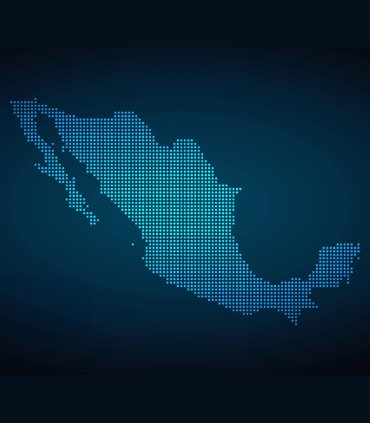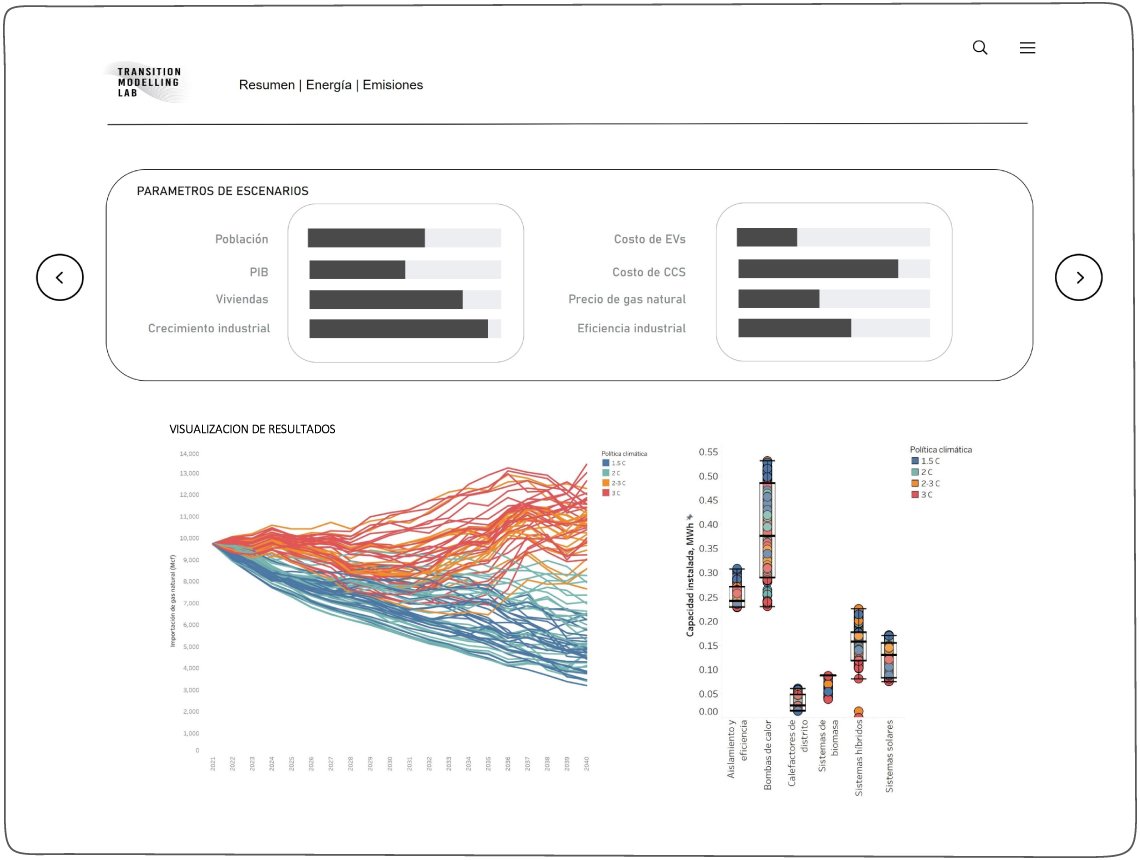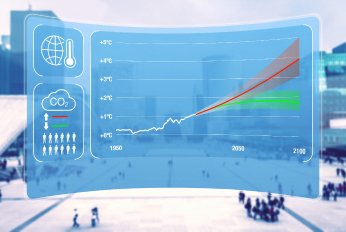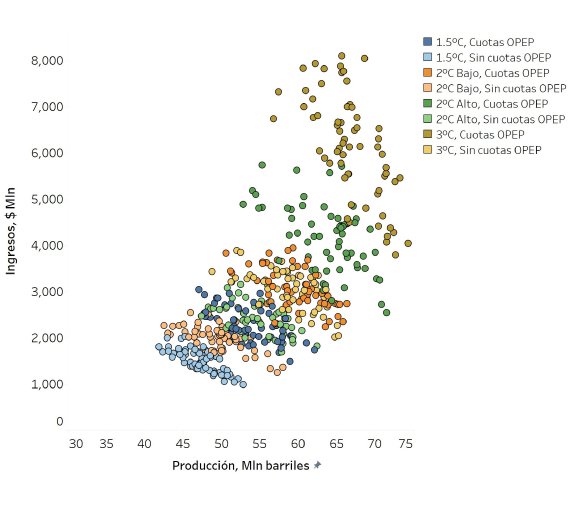
Data-driven decision making and advanced modelling.
Transition Modelling Lab is the only provider of scenarios of the Mexican energy system based on advanced mathematical-computational modelling tools developed in-house. Moreover, we developed the only existing model of the Mexican energy system that generates results at national and state level: TIMES MX32.
Our platform allows the user to visualise a wide range of decarbonisation scenarios, from baseline scenarios under current policies, to scenarios consistent with 2ºC, 1.5ºC and net zero emissions. Investigating various energy system scenarios facilitates the evaluation of energy security, cost, and robustness across multiple decarbonization pathways, from a global scale down to national and local contexts. This encompasses scenarios in which the potential uncertainties of the future might present advantages or financial implications that traditional planning approaches may not readily identify.
There is no other energy consulting firm in Mexico with the level of experience and modeling proficiency that Transition Modelling Lab possesses to offer the following services:


Mexico Energy Transition Outlook – Annual Publication
Currently, there is no comprehensive yearly report that provides medium- to long-term projections for Mexico’s energy system based on advanced energy systems models.
The annual Mexico Energy Transition Outlook offers an independent analysis of Mexico’s energy system to 2050, through an exploration of long-term scenarios using Transition Modelling Lab’s advanced modelling tools. Our modelling considers the whole Mexican energy system, from hydrocarbon extraction and transformation to final consumption of energy services.
Our experts’ assessments take into account the consequences at the sector level for Mexico’s energy infrastructure under different decarbonization strategies. This analysis takes into consideration the current energy and climate policies up to the year the report is published and investigates a broad spectrum of plausible scenarios both on a global and national level. The scenarios modeled also account for the effects of major global disruptions, like the COVID-19 pandemic, political upheaval in the Middle East, or events like the Russian invasion of Ukraine, and how these events could affect Mexico’s energy landscape.
The Mexico Energy Transition Outlook 2024 will be published in the third quarter of 2024.

Exploration of global, national and sub-national energy system scenarios
Our models encompass the whole energy system from resources extraction and conversion, to the delivery of energy services in end-use sectors such as agriculture, industry, residential, commercial, and transportation. Furthermore, we have the modelling capability to perform techno-economic assessments within the electricity, hydrocarbon, and transport sectors.
To gain a clearer insight into the energy system to make informed decisions, it’s essential to examine a wide range of scenarios, considering diverse climate policies and potential uncertainties. Transition Modelling Lab enables non-modellers and modellers alike to visualize numerous decarbonization scenarios, ranging from baseline scenarios that reflect current climate policies to scenarios aligned with 2°C, 1.5°C, and net-zero emissions goals. Each Mexican state’s energy system is individually represented, offering an unparalleled level of regional detail in modelling and understanding sector dynamics to date.
Moreover, Transition Modelling Lab offers a scenario modeling interface that allows users to select key assumptions within the input data to delve into a range of plausible energy scenarios. This includes variables like energy service demand, electric vehicle costs, climate objectives, renewables potential, and natural gas pricing, among others. Our interactive platform enables users to immediately see how various input parameters influence the outcomes of the modelled scenarios.
Our projections can be used to inform the strategic analysis of decarbonisation pathways, as well as the assessment of transition risks and opportunities. The following are some of the energy transition related questions that users aim to answer:
-
What mix of technologies would constitute the least costly future energy system under the assumptions of each scenario?
-
What would be the construction rates of new (low-carbon) infrastructure required to achieve mitigation targets?
-
To what extent are decarbonisation pathways sensitive to fuel prices and technology costs?
-
How do optimal decarbonisation strategies vary from state to state in Mexico?
-
How might power system technology mixes and their main parameters such as capacity, generation and interconnection flows evolve?
-
Is it possible to generate company decarbonisation roadmaps that are robust to uncertain energy futures?
-
Is it possible to quantify transition opportunities and risks for investment and divestment decisions?


Exploring short- and long-term scenarios for the power sector
The power sector is key to facilitating a low-carbon transition in Mexico.
Transition Modelling Lab’s tools allow the user to explore future scenarios of Mexico’s power system consistent with different levels of electrification (and decarbonisation) of end-use sectors. Our platform offers a detailed view of the power system over short-term periods, featuring high spatial and temporal precision, and also illustrates medium- to long-term projections across various levels of electricity demand.
Transition Modelling Lab’s visualisation platform allows users to understand how different market, policy and technology assumptions can influence asset valuation, using multiple scenarios of the power sector as well as the whole energy system.
Our power systems modelling platform can provide insights on:

-
Strategic perspectives on power sector dynamics.
-
Regional market price forecasting and hourly time resolution up to 2050.
-
Analysis of market price volatility of fuels and generated electricity.
-
Analysis of generation technology portfolios.
-
Storage needs under scenarios of high penetration of variable renewable sources.
-
Impact of emerging generation technologies such as carbon capture, transport and storage, power-to-X, hydrogen, etc.

Robust decarbonisation strategies for companies
Companies are recognising the importance of reducing their operational and supply chain emissions, as investors and customers increasingly demand actions that move us towards a low-carbon economy. Estimating emissions is the first step in setting science-based climate targets. However, while more and more companies are setting climate targets, they often lack a solid energy transition plan to achieve them.
The future of the national energy system and the financial performance of companies are uncertain. Plans made today may not be practical tomorrow due to cost or feasibility. It is essential that companies have flexible decarbonisation strategies that can withstand the passage of time and changing conditions.
At Transition Modelling Lab we tailor transition roadmaps for your company. We model a wide range of plausible decarbonisation scenarios for your company, considering multiple global and national climate policies and assumptions about key energy system parameters.
In addition, we assess the financial impact of these decarbonisation scenarios on companies’ financial statements to help them define a robust transition strategy.
In short, we assist you in confidently saying ‘yes’ to the following questions:

-
Do you know your company's carbon footprint?
-
Are your emissions targets aligned with climate science?
-
Does your company have a robust and feasible transition plan for various future scenarios?
-
Do you have decarbonisation roadmaps for your company?
-
Do you understand your company's climate transition risks?

Assessment of transition risks and opportunities
A transition to a low-carbon energy system entails risks for companies and their carbon-intensive assets, as these may be underutilised or retired early. It may also result in reputational and legal risks for asset owners who fail to make sufficient progress in their decarbonization efforts.
Estimating transition risks for companies, assets and investment portfolios requires energy system modelling capabilities at global, national and sectoral levels. In addition, consideration of uncertainty is crucial for assessing technology and market transition risks, beyond regulatory and climate policy risks.
Transition Modelling Lab’s modelling platform allows us to quantify transition risks and identify investment opportunities under a wide range of future scenarios, as well as to estimate the impact of a wide range of plausible scenarios on your company’s financial statements.
For instance, we can assess how an oil and gas company’s production and revenues might be impacted under a wide range of scenarios driven by different global climate policies, (hence different fossil fuels demand), tax regimes and OPEC behaviour.


Development of global, national and sub-national models
Publicly available modelling scenarios (such as IEA, NGFS, IRENA, BP, etc.) consider a limited number of narratives under largely unknown assumptions. In addition, modelling results are only available for a limited number of variables. Moreover, without access to the models and their limitations, it is difficult to properly interpret their results. This limits analysts’ ability to understand scenarios and make robust conclusions, which is why carbon-intensive companies are increasingly interested in building their own energy system scenarios to explore their vision of the future.
Transition Modelling Lab offers the development of global, national and sub-national models to allow your organisation to generate tailored scenarios based on your own narratives and assumptions.
Do not hesitate to contact us to discuss your energy modelling and analysis needs.

Newsletter about Mexico’s energy transition
Our monthly newsletter includes articles relevant to the energy transition in Mexico with regular analysis on the decarbonisation of the energy system (at global, national, state and sectoral level). Our publication allows subscribers to access expert analysis on topics related to global and national energy transition issues, from emerging technologies, geopolitical events and climate policy trends, to risks, opportunities and challenges in the Mexican market.
Periodically, we will also include articles based on modelling specific decarbonisation scenarios of Mexico’s energy system, with analysis and recommendations based on the results. This will allow subscribers to better understand the short- and medium-term implications of different long-term energy futures.
Our first Transition Modelling Lab newsletter will be available soon.


